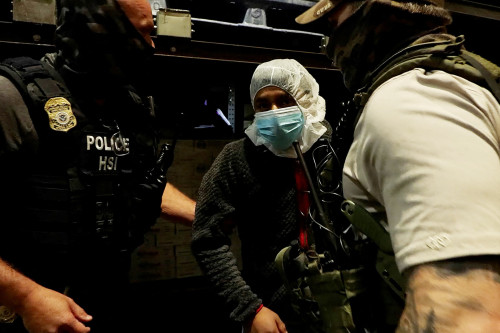By Tom Polansek
CHICAGO (Reuters) -U.S. meat producer Glenn Valley Foods was operating an Omaha, Nebraska, facility with about 30% of its staff on Wednesday after federal agents detained workers in an immigration raid the previous day, slashing the output of products it sells to grocery stores and restaurants, the company’s president said.
In the wake of Tuesday’s sweep by U.S. Immigration and Customs Enforcement agents, livestock traders and market analysts expressed concerns that the potential deportation of undocumented workers from such raids could disrupt U.S. food production at a time when beef prices have soared and meat processors report a labor shortage.
ICE agents detained about 74 to 76 workers out of roughly 140 at the Glenn Valley Foods plant, President Chad Hartmann said. Other workers did not show up on Wednesday because they felt afraid or traumatized, he said, adding that the facility’s production dropped to about 20% of normal.
Glenn Valley Foods sells steak, chicken and corned beef products to restaurants and grocery stores, according to its website.
Retail beef prices have set records as the size of the U.S. cattle herd has declined to its lowest level in 70 years after a years-long drought raised feed costs. Consumer demand for steaks and hamburgers has stayed strong nevertheless.
Glenn Valley Foods is trying to determine how long it will take to hire new employees, Hartmann said.
“The hole that got punched into our business is staffing,” he said.
Livestock traders worried that immigration raids could slow meat companies’ demand to buy cattle from farmers to process into beef, if the companies do not have enough workers. Chicago Mercantile Exchange cattle futures came under pressure on Tuesday during the raid, after recently hitting records.
“There’s certainly going to be nervousness out there on where the labor situation goes, going forward,” said Matt Wiegand, a commodity broker for risk management firm FuturesOne in Nebraska.
Meatpackers still face an acute worker shortage, said Julie Anna Potts, president of the Meat Institute industry group. It worsened during the COVID-19 pandemic, when major companies such as Tyson Foods temporarily shut plants because of a lack of workers.
Glenn Valley used E-Verify, a federal database used for checking employees’ immigration status. Hartmann said Homeland Security told him on Wednesday that there was no better system.
“We will have to continue to use it,” he said.
ICE said a criminal investigation was ongoing into what immigration officials called a large-scale employment of immigrants who are present in the U.S. illegally.
Footage of the Glenn Valley raid released by ICE showed agents searching the plant, restraining workers’ hands and ankles, and taking them into custody.
ICE officers have been intensifying efforts in recent weeks to deliver on U.S. President Donald Trump’s agenda of record-level deportations.
Tensions boiled over in Los Angeles over the weekend when protesters took to the streets after ICE arrested migrants at Home Depot stores, a garment factory and a warehouse, according to rights advocates. On Tuesday night, demonstrators marched in New York, Atlanta and Chicago.
More than half of all meatpacking workers in the U.S. are immigrants, according to the Center for Economic and Policy Research, a think tank.
The Omaha World-Herald newspaper said on Tuesday that raids were also reported at local plants run by large meatpackers Tyson and JBS USA. Tyson and JBS told Reuters their facilities were not raided.
(Reporting by Tom Polansek; Editing by Aurora Ellis)









